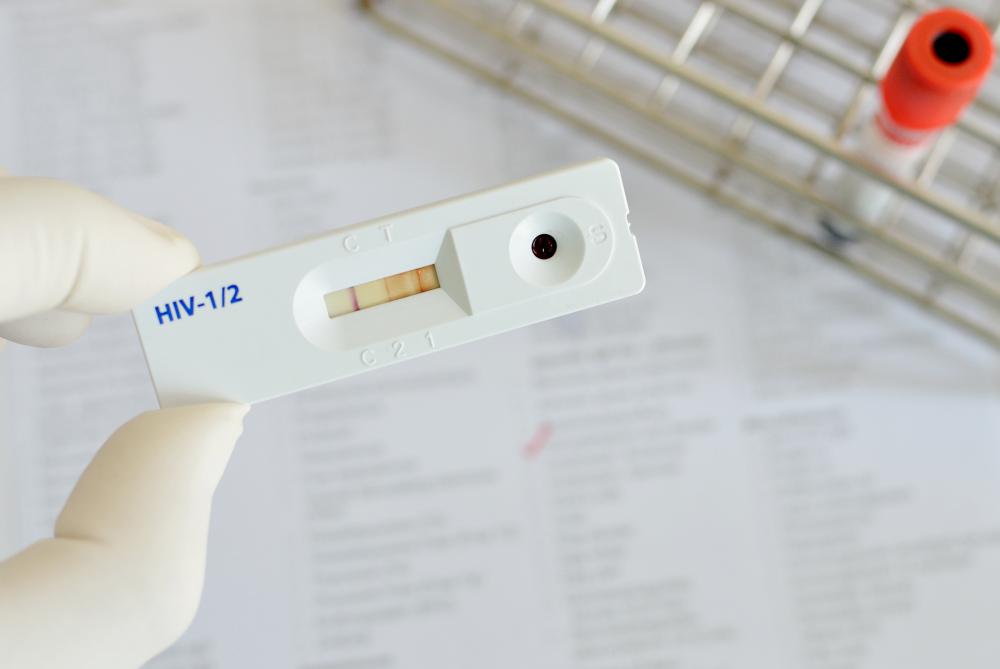At WiseGEEK, we're committed to delivering accurate, trustworthy information. Our expert-authored content is rigorously fact-checked and sourced from credible authorities. Discover how we uphold the highest standards in providing you with reliable knowledge.
What are Bloodborne Pathogens?
Bloodborne pathogens are agents of disease such as viruses which inhabit the blood. A disease which is caused by a bloodborne pathogen may be known as a bloodborne disease or illness. Because many bloodborne pathogens are extremely virulent and difficult to treat, medical professionals usually use a variety of measures to reduce the risk of transmitting such pathogens. Training in avoidance of bloodborne diseases is offered at many levels of the medical community and to people who may be at risk of exposure, such as teachers, who may be needed to provide first aid care to injured students.
In addition to being present in human blood, some bloodborne pathogens can be found in other body fluids; AIDS, for example, is present in the blood, but it can also be passed through sexual activity because it may be present in semen. Other examples of bloodborne pathogens include hepatitis B and C, malaria, syphilis, and HIV. These pathogens can be detected with blood tests which look for antibodies developed in response to exposure to these pathogens.

In order to transmit a bloodborne pathogen, blood to blood contact is generally required. For example, nurses and phlebotomists are at high risk of exposure due to needle stick injuries. Such pathogens can also sometimes be passed through open sores, or through needle sharing among people who use intravenous drugs. Although many people associate sexual activity with the transmission of diseases like hepatitis C, many bloodborne pathogens can only be transmitted when blood is present; some sexual activities may not be advisable, while others can be made reasonably safe with barrier protection.

In hospitals, stringent protocols are followed to avoid unnecessary exposure to bloodborne pathogens, especially when these agents of disease are found in other bodily fluids. For example, all needles are used only once, and then disposed of in specialized containers. Surgical equipment is carefully sterilized to make it safe, and hospital personnel are careful to avoid any blood to blood contact with patients. If someone is exposed through something like a needle stick injury, prophylactic drugs may be prescribed.

Some biologists specialize in the study of bloodborne pathogens, looking at how these pathogens evolve and possible techniques which could be used for treatment. Some disease agents like the virus which causes HIV are both virulent and difficult to treat despite the best efforts of the scientific community, while diseases like malaria and syphilis, which were once scourges, are now treatable with modern medications.
AS FEATURED ON:
AS FEATURED ON:

















Discussion Comments
@M1ddle - Don't be afraid to ask if any tattoo studio you visit opens a new pack of needles for every customer! You should definitely make sure they are at least thoroughly sanitizing needles for each tattoo. Low prices might be appealing, but the risk isn't worth the money you might save at a tattoo parlor that doesn't use fresh needles every time.
Do your research and ask questions before you commit to a tattoo. The same goes for piercings. It's worth spending the extra money if you know that you're safe from disease.
I was thinking about getting my first tattoo this summer. Should I ask the tattoo artist if he or she uses a new needle every time? I don't want to be exposed to a blood borne pathogen like hepatitis or AIDS.
Post your comments